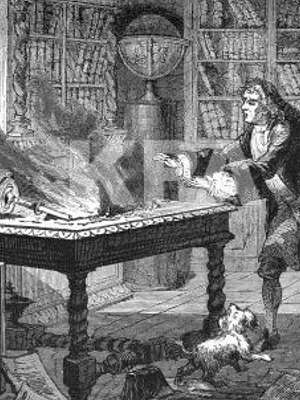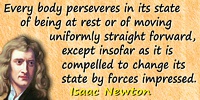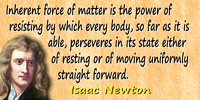 (source)
(source)
|
Sir Isaac Newton
(25 Dec 1642 - 20 Mar 1727)
English physicist and mathematician who made seminal discoveries in several areas of science, and was the leading scientist of his era.
|
NEWTON AND THE DOG.
from Notes and Queries (1888)
[p.41] The Dean of Wells has a very interesting article in the Nineteenth Century for this month on his predecessors in that cathedral. In speaking of comparatively recent removals of some ancient stained glass windows in that historic building, he refers, by way of illustration, to the very old story about Sir Isaac Newton and his dog. The animal is said to have accidentally burnt some papers of great value, whereat the philosopher exclaimed, “Oh, Diamond, Diamond, thou little knowest what mischief thou hast done!”
The truth of this story has often been called in question. Sir David Brewster thinks it quite a sufficient confutation of it to refer to “the remark of Dr. Humphrey Newton that Sir Isaac never had any communion with dogs or cats.” Dr. Humphrey’s acquaintance, however, with the habits of his great namesake (he was no relation) appears to have been limited to the five years (1684 to 1689) during which he was occupied as his assistant and amanuensis at Cambridge. Respecting this period he wrote to Mr. Conduitt that Newton “kept neither dog nor cat in his chamber, which made well for the old woman, his bedmaker, she faring much the better for it, for in a morning she has sometimes found both dinner and supper scarcely tasted of.” It was whilst Dr. Humphrey was thus employed that the ‘Principia’ was composed, and he told Mr. Conduitt that he copied it out before it went to the press. It is evident that if the story be true about the dog having burnt any of Sir Isaac’s papers, these formed no part of that great work, as the Dean of Wells appears inadvertently to have supposed. That some of his scientific papers were at some time destroyed by a candle left burning is certain; but when it is difficult to say. Possibly it may have happened more than once, particularly as Newton was undoubtedly troubled with that carelessness which arises from absence of mind. Dr. Humphrey Newton says that it was before he wrote the ‘Principia.’
On the other hand, Brewster shows that the natural conclusion from the reference to the unfortunate candle in De la Pryme’s ‘Diary’ is that the burning took place about the end of 1691 or beginning of 1692. He states that the accident arose from Newton leaving the candle alight whilst going to chapel on a winter’s morning. Mr. Conduitt wrote a memorandum upon it after a conversation with Newton, and stated that the candle was thus left whilst “he went down into the bowling-green, and meeting somebody who diverted him from returning as be intended.” He does not mention any date, but says that Newton “said he believed there was something in the papers which related to both [the ‘Optics’ and ‘Method of Fluxions’], and that he was obliged to work them all over again.” Absurdly exaggerated reports got abroad respecting the accident; and Prof. Sturm, of Altorf, mentioned to Dr. Wallis a rumour which had reached him that Newton’s “house and books and all his goods were burnt, and himself so disturbed in mind thereupon as to be reduced to very ill circumstances”; on which Dr. Wallis remarks that this “being all false, I thought fit presently to rectify that groundless mistake.” An early correspondent of ‘N. & Q.,’ however (1st S. xii. 501)*, seems to have seen the statement and not its rectification or confutation; for Brewster shows clearly that the temporary clouding of Newton’s intellect (whatever it amounted to) could have had nothing to do with the burning of his papers. The cause was loss of sleep and appetite, arising doubtless from prolonged labour and study; and it must have commenced in the autumn of 1692, as his letter to Mr. Pepys, in which he states that he had suffered from it for a twelvemonth and had lost his former “consistency of mind,” is dated Sept. 13, 1693.
The statement that the destruction of the papers was caused by a dog called Diamond upsetting the candle was, I believe, first made in a note in Thomas Maude’s ‘Wensleydale.’ Maude says that it occurred “in the latter part of Sir Isaac’s days,” and that it “is authenticated by a person now living [1780].” Now the fact mentioned by Dr. Humphrey Newton that Sir Isaac, whilst he was with him at Cambridge, kept neither dog nor cat [p.42] is no proof that be may not have become attached to a dog in later life. I have only had experience myself of such attachment within the last few years. But I must make two remarks. If Sir Isaac had a second accident late in life of having papers burnt by a candle, so far from relating to the ‘Principia,’ they could not have been on high mathematical subjects. Secondly, if the candle were really upset by a favourite dog, though I am far from wishing to impugn the general excellence of Newton’s temper, I do not think he deserves any special commendation for not adding “a single stripe” to his (real or supposed) celebrated exclamation, “Thou little knowest what mischief thou hast done,” since no one who felt any attachment to a dumb animal would strike it for so unintentional an act.
Blackheath.
- Science Quotes by Sir Isaac Newton.
- 25 Dec - short biography, births, deaths and events on date of Newton's birth.
- Isaac Newton - biography from Famous Men of Science (1889)
- Isaac Newton - Comments on his “Playing on the Seashore” Quote
- Isaac Newton - “Playing on the Seashore” illustrated quote - Medium 500px.
- Isaac Newton - “Playing on the Seashore” illustrated quote - Large 800px.
- Isaac Newton - context of quote “A change in motion” - Medium image (500 x 250 px)
- Isaac Newton - context of quote “A change in motion” - Large image (800 x 400 px)
- Isaac Newton - context of quote “In experimental philosophy” - Medium image (500 x 250 px)
- Isaac Newton - context of quote “In experimental philosophy” - Large image (800 x 400 px)
- Isaac Newton - context of quote “Standing on the shoulders of giants” - Medium image (500 x 250 px)
- Isaac Newton - context of quote “Standing on the shoulders of giants” - Large image (800 x 400 px)
- Isaac Newton - context of quote “Impressed force is the action” - Medium image (500 x 250 px)
- Isaac Newton - context of quote “Impressed force is the action” - Large image (800 x 400 px)
- Isaac Newton - context of quote “Inherent force of matter is the power of resisting…” - Medium image (500 x 250 px)
- Isaac Newton - context of quote “Inherent force of matter is the power of resisting…” - Large image (800 x 400 px)
- Isaac Newton - context of quote “Plato is my friend” - Medium image (500 x 250 px)
- Isaac Newton - context of quote “Plato is my friend” - Large image (800 x 400 px)
- Isaac Newton - context of quote “Colours which appear through the Prism ” - Medium image (500 x 250 px)
- Isaac Newton - context of quote “Colours which appear through the Prism ” - Large image (800 x 400 px)
- Isaac Newton - context of quote “Nature does nothing in vain” - Medium image (500 x 250 px)
- Isaac Newton - context of quote “Nature does nothing in vain” - Large image (800 x 400 px)
- Isaac Newton - context of quote “No more causes of natural things should be admitted” - Medium image (500 x 250 px)
- Isaac Newton - context of quote “No more causes of natural things should be admitted” - Large image (800 x 400 px)
- Isaac Newton - context of quote “Truth is ever to be found in simplicity” - Medium image (500 x 250 px)
- Isaac Newton - context of quote “Truth is ever to be found in simplicity” - Large image (800 x 400 px)
- Isaac Newton - context of quote “Every body perseveres in its state of being at rest” - Medium image (500 x 250 px)
- Isaac Newton - context of quote “Every body perseveres in its state of being at rest” - Large image (800 x 400 px)
- Isaac Newton - context of quote “God, in the beginning, formed matter” - Medium image (500 x 250 px)
- Isaac Newton - context of quote “God, in the beginning, formed matter” - Large image (800 x 400 px)
- Isaac Newton - context of quote “The cause of gravity is what I do not pretend to know” - Medium image (500 x 250 px)
- Isaac Newton - context of quote “The cause of gravity is what I do not pretend to know” - Large image (800 x 400 px)
- Sir Isaac Newton’s Apple-Tree - debunking the myth, from Historic Ninepins: A Book of Curiosities by John Timbs (1869)
- Booklist for Isaac Newton.








